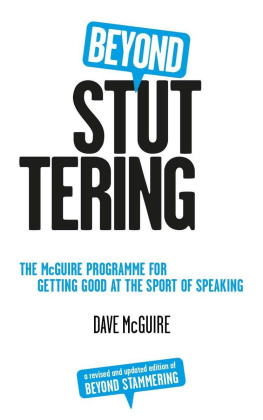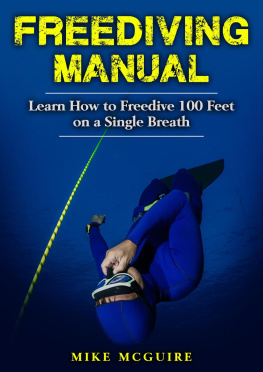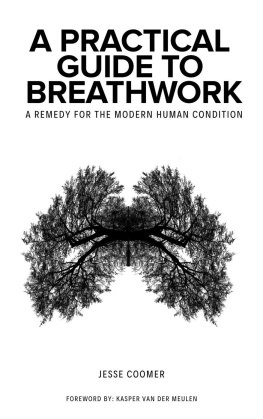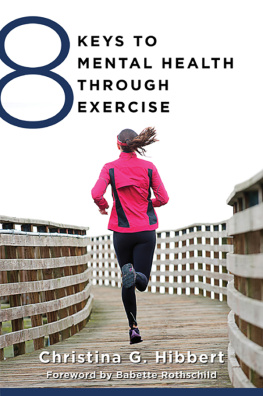
Souvenir Press,
43 Great Russell Street, London WC1B 3PD
This ebook edition first published in 2011
All rights reserved 2002 by Dave McGuire
The right of Dave McGuire to be identified as author of this work has been asserted in accordance with Section 77 of the Copyright, Designs and Patents Act 1988
This ebook is copyright material and must not be copied, reproduced, transferred, distributed, leased, licensed or publicly performed or used in any way except as specifically permitted in writing by the publishers, as allowed under the terms and conditions under which it was purchased or as strictly permitted by applicable copyright law. Any unauthorised distribution or use of this text may be a direct infringement of the authors and publishers rights, and those responsible may be liable in law accordingly
ISBN 9780285639065
This book is dedicated to my children , my parents and all those who participated in our mission to help people who stammer throughout the world .
About myself and the programme

In 1969, after trying several forms of therapy, I had a chance to defeat my severe stammer with the help of Dr Joe Sheehan. At the time he was a psychology professor at UCLA and considered to be one of the very best stammering therapists in the world. His programme was based on active non-avoidance and acceptance of oneself as a stammerer. Although my speech had improved and I was able to develop a career in adolescent psychology, my lack of discipline and downright laziness resulted in many severe relapses that devastated my personal and professional life. In critical moments when I really needed to speak well, the words would not come.
In November 1993, after twenty-four more wasted years, I was given another chance in a diaphragm training programme developed by a famous opera singer in Amsterdam. I found that the diaphragm training resulted in a strong, immediate fluency but would not hold up over time. By applying Dr Sheehans concepts, however, I found I was able to recover from relapses. Although I am not yet permanently cured, I am totally fluent 99.9 per cent of the time.
I figured the combination of diaphragm training and non-avoidance/role-conflict resolution would be a powerful combination to help many others overcome the affliction of stammering. In February 1994, the McGuire Programme became a reality. In 1995 the programme evolved from my to ours as more graduates have become coaches organising courses and providing critical follow-up support throughout the United Kingdom, Ireland, U.S.A., Norway and Australia.
Dave McGuire
Preface
by John Harrison
My first encounter with Dave McGuire and the McGuire Programme took place at the Fourth International Conference for People who Stammer, held in Linkping, Sweden, during the summer of 1995. As we chatted about common interests, I learned that Dave had previously run an innovative programme for teenage boys with behavioural problems. Back in the 1960s I had been an active sponsor of a similar kind of residential programme for drug addicts. Both of us had seen that the only way to effect lasting behavioural change was to address the entire person.
Daves approach to stammering combines his training in psychology with other stammering therapies and sports psychology. Into the mix also went the know-how gained from his experience of working with difficult teenagers. This eclectic background accounts, in part, for the uniqueness of the McGuire Programme. Its also sets Dave apart from most others working in the field of stammering remediation.
At the end of our initial conversation, Dave asked whether I would like to stop by and observe a demonstration of his programme run with several of his graduates. I would indeed, and off we went to his workshop. My first impression of the workshop is still etched in memory a group of men and women in a circle taking deep breaths with belts strapped around their chests. What in the world were they doing? I wasnt sure what to make of it, but I was really curious. During further conversations at the conference, it became clear that Dave and I shared a common view of stammering, and we promised to stay in touch once the conference was over.
I was intrigued with the McGuire Programme. As someone who had stammered for roughly 30 years and who had made a full and lasting recovery, I saw a recovery strategy similar to what I, myself, had followed. As an migr to California from New York in the early 1960s, I had immersed myself in the personal growth movement that was flourishing on Americas west coast. Id grown up with a very fuzzy image of myself and needed to change many beliefs and behaviours that did not serve me well. In working to build self-esteem and get my own house in order, something very interesting happened: my stammering gradually slipped away.
According to most speech therapists, this was not supposed to happen. The prevailing belief was once a stammerer, always a stammerer. But that was evidently not true, at least for some people. Over time, I saw that my stammering was not simply a product of bad speech behaviours, it was also a reflection of who I was as an individual how I thought and felt, how I functioned, what I believed. My speech blocks had everything to do with the system of self that I had created, a system that supported a dysfluent way of speaking. Therefore, to make permanent changes in my speech, I had to address a total system that included my emotions, perceptions, beliefs, intentions, and speech behaviours. And it all had to be brought into alignment.
What so intrigued me about the McGuire Programme was that this was the first programme Id encountered that took a broad, holistic approach to stammering and that touched on many of the same issues that I had addressed in my own recovery. Not only did the McGuire Method focus on the speech process itself, it also focused on the underlying factors that supported the stammering behaviour. Even today, several characteristics of the programme are truly unusual.
- The programme uses costal breathing to keep the breath open and prevent speech blocks. The programme focuses not just on can I speak? but on how do I want to speak? Eloquence is a stop on the path to fluency.
- Graduates do the teaching and coaching there is no professional staff of speech therapists giving teeth to the concepts that (1) the real experts are those who have personally worked through the problem, and (2) best way to learn something is to teach it to others.
- McGuire also has the best long-term follow-up programme in the world. It is free and open ended. Coaches and those being coached routinely connect by phone and email and those connections often reach half way around the world.
- A graduate can go through the programme any number of times for just a very small token fee.
- Graduates are free to suggest changes to the course, which accounts for the fact that the McGuire Programme continues to evolve.
This book will be useful to anyone who wants to gain a clear and detailed picture of what is involved in the recovery process. As youll discover, the road will take you through more than just changes in how to speak and how to manage speech blocks. It will help bring to awareness the subtle ways in which youve shaped your world to support your stammering. Youll also acquire a better sense of those issues that need to be addressed in order to break through into a newer, freer way of speaking.
Youll learn, not just about how to acquire fluency, but how to keep it. Youll develop an understanding of the various factors that trigger relapses why they happen, and what to do about them.
Next page











